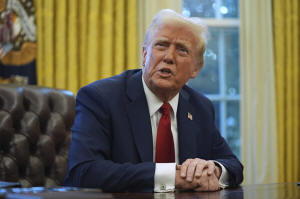President Trump to meet with Nvidia CEO Jensen Huang at the White House
 Send a link to a friend
Send a link to a friend
 [February 01, 2025] By
JOSH BOAK, KEVIN FREKING and SARAH PARVINI [February 01, 2025] By
JOSH BOAK, KEVIN FREKING and SARAH PARVINI
President Donald Trump is meeting Friday with Nvidia CEO Jensen Huang,
whose company designs and supplies the advanced computer chips that play
an integral role in developing artificial intelligence.
The meeting at the White House was confirmed by a person familiar who
insisted on anonymity to discuss the conversation between Huang and
Trump. The person said the meeting was set up weeks ago and would enable
them to get acquainted and talk about AI policy. Nvidia, based in Santa
Clara, Calif., declined to comment on the meeting.
Nvidia had loudly protested a last-minute move by the Biden
administration in January to expand AI chip restrictions beyond
adversaries like China to more than 100 other countries, including
Singapore. But it remains to be seen if Trump will follow through with
or drop those proposed rules.
Trump signed an order on his first day in office last week that said his
administration would “identify and eliminate loopholes in existing
export controls,” signaling that he might continue and harden Biden’s
approach.
The Republican president is banking on AI to foster economic growth and
draw hundreds of billions of dollars in investments, but he also saw the
performance of China’s DeepSeek AI technology as a sign that the
technology can be developed more cheaply.

Speaking Monday to House Republicans in Miami, Trump called the DeepSeek
news “positive” if it’s accurate because “you won’t be spending as much
and you’ll get the same result.”
Trump said it was a “wake-up call for our industries that we need to be
laser-focused on competing to win.”
DeepSeek has said its recent models were built with Nvidia’s
lower-performing H800 chips, which are not banned in China. DeepSeek
began attracting more attention in the AI industry last month when it
released a new AI model that it boasted was on par with similar models
from U.S. companies such as ChatGPT maker OpenAI, and was more
cost-effective in its use of expensive Nvidia chips to train the system
on troves of data. The chatbot became more widely accessible when it
appeared on Apple and Google app stores early this year.

[to top of second column] |

President Donald Trump speaks as he signs executive orders in the
Oval Office at the White House, Thursday, Jan. 30, 2025, in
Washington. (AP Photo/Evan Vucci)
 The meeting between Trump and Huang
comes as leaders of a special House committee focused on countering
China have urged Trump’s national security adviser, Michael Waltz,
to consider the potential national security benefits of placing
export controls on Nvidia semiconductor chips used by DeepSeek. They
said the examination should be part of a review that Trump ordered
on his first day in office that called on the secretaries of State
and Commerce to review the U.S. export control system.
Rep. John Moolenaar, the chairman of the committee, and Rep. Raja
Krishnamoorthi, the ranking Democrat on the committee, said DeepSeek
made extensive use of a Nvidia chip designed specifically to fall
outside U.S. export controls. The lawmakers said that the committee
supports American AI innovation, and that support “includes imposing
reasonable safeguards” to protect those innovations from China.
“This demonstrates what the Select Committee has long argued:
frequently updating export controls is imperative to ensure (China)
will not exploit regulatory gaps and loopholes to advance their AI
ambitions,” the two lawmakers wrote in letter dated Wednesday.
The pair asked that Waltz look for ways to strengthen controls on
shipments through third countries “that pose a high risk of
diversion.” Singapore, the letter said, represented 22% of Nvidia’s
revenue in its most recently quarterly statement, “despite the
company itself revealing most of these shipments ultimately went to
users outside of Singapore.”
Countries such as Singapore, they added, should be subject to strict
licensing requirements if they aren't willing to “crack down” on
China using their country as an intermediary for shipments.
In an emailed statement, Nvidia said that its revenue associated
with Singapore "does not indicate diversion to China."
“Our public filings report ‘bill to’ not ‘ship to’ locations of our
customers,” a Nvidia spokesperson said. “Many of our customers have
business entities in Singapore and use those entities for products
destined for the U.S. and the west. We insist that our partners
comply with all applicable laws, and if we receive any information
to the contrary, act accordingly.”
All contents © copyright 2025 Associated Press. All rights reserved |